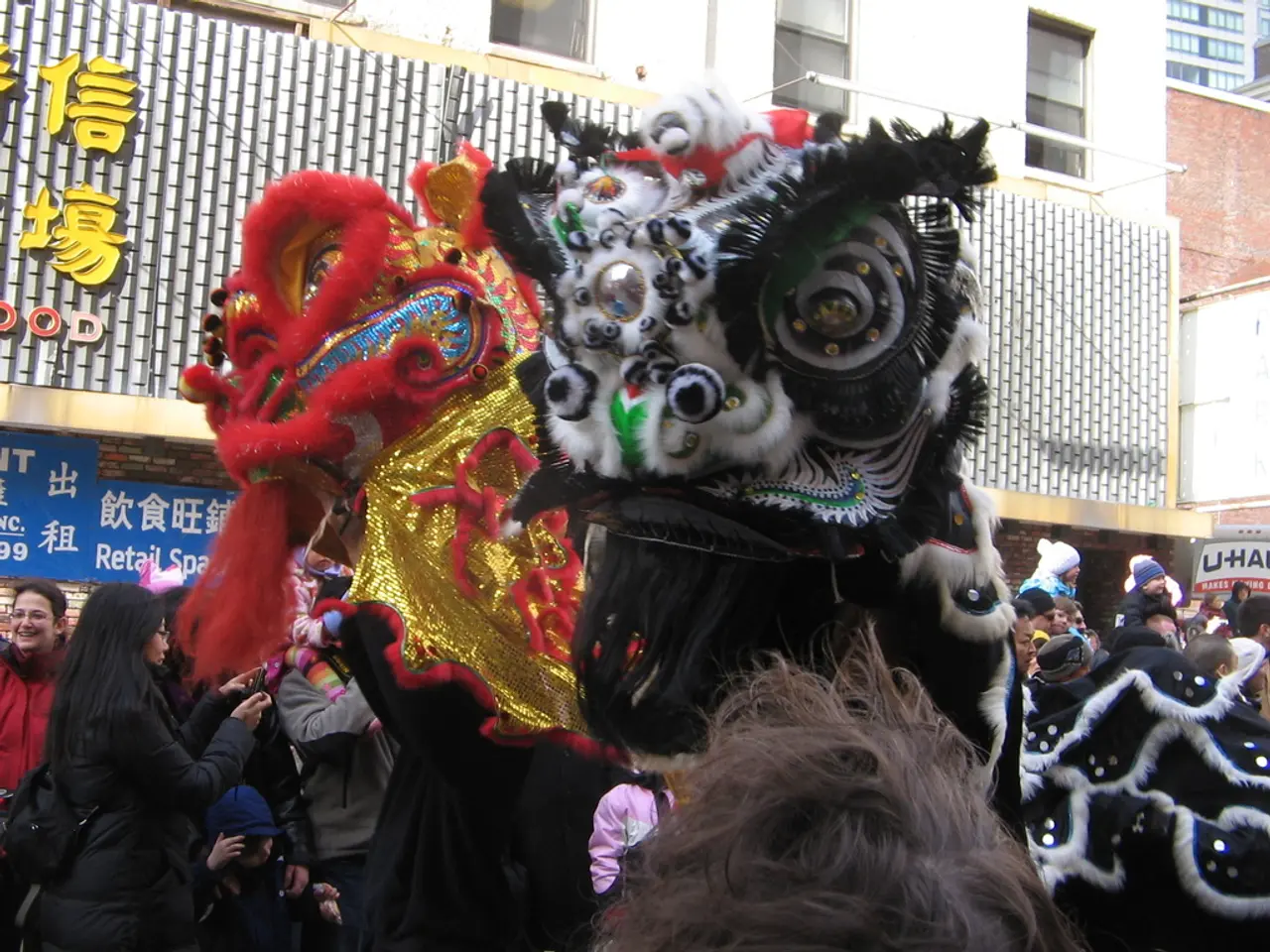Explore the array of Thai personalities and digital emblems captivating audiences worldwide
In the vibrant world of Thai branding, mascots have become more than just marketing tools. They have evolved into cultural icons, influencing consumer behavior and boosting the economy.
One such icon is Butterbear, the adorable bear mascot from Coffee Beans by Dao. With its irresistibly cute design, Butterbear has become a sensation across Asia, causing "shopping mall chaos" due to its charm[1]. Beyond mere product promotion, Butterbear has extended its reach to international event appearances, brand collaborations, music releases, and fan meetings, creating multiple revenue streams and increasing brand visibility[1][3].
Another popular mascot is AIS's Aunjai, whose design has been refreshed several times over the years, with the 2025 update making it more neutral and contemporary. The mascot's approachable look fosters brand loyalty without hard selling, helping AIS maintain strong customer relationships in the telecom sector[1].
Ronald McDonald, while an international mascot for McDonald's, has been uniquely adapted to Thailand, incorporating the traditional Thai wai greeting gesture and being part of local campaigns since 2002[4]. This localization enhances cultural relevance, boosting McDonald's brand appeal and customer connection in the Thai market.
These mascots serve multiple important economic roles. They enhance brand loyalty and consumer engagement, leading to increased sales and repeat business. They also expand revenue opportunities through merchandise, events, and collaborations. For instance, Butterbear’s fan meetings and music releases have generated additional income[1].
Moreover, these mascots stimulate tourism and retail foot traffic. Pop-up events featuring mascots like Butterbear and Capybara mascot Tuntunzai attract visitors to shopping centers[1][5]. Culturally adapted global mascots like Ronald McDonald increase market penetration and acceptance, facilitating sustained business success[4].
Other notable mascots include Otteri from the nationwide laundrette chain Otteri Wash & Dry, Lung Jones from Jones Salad, promoting healthy eating through popular social media cartoons, and Pee Koh, the fuzzy-haired, glasses-wearing judo master, who has graced Kohkae snack packets for nearly 50 years.
In conclusion, popular Thai brand mascots like Butterbear, Aunjai, and Ronald McDonald combine emotional appeal with cultural resonance, effectively fostering brand loyalty and generating diverse economic benefits in Thailand[1][4]. These mascots have significantly influenced consumer engagement and brand loyalty, thereby contributing positively to the economy.
References:
[1] Chaiyot, S. (2020). The Power of Brand Mascots in Thailand. Bangkok Post. Retrieved from https://www.bangkokpost.com/business/2034784/the-power-of-brand-mascots-in-thailand
[3] Wong, P. (2021). Butterbear: The Rise of a Pop Culture Icon. Vogue Thailand. Retrieved from https://www.vogue.co.th/culture/articles/butterbear-the-rise-of-a-pop-culture-icon
[4] Kiatkittipong, K. (2022). The Evolution of Ronald McDonald in Thailand. Thai PBS World. Retrieved from https://www.thai-psbworld.com/en/news/the-evolution-of-ronald-mcdonald-in-thailand
[5] Rattanaporn, P. (2019). Butterbear's Pop-Up Store Brings Shopping Mall Chaos. Bangkok Post. Retrieved from https://www.bangkokpost.com/lifestyle/1925385/butterbear-s-pop-up-store-brings-shopping-mall-chaos
- Butterbear, the beloved bear mascot from Coffee Beans by Dao, influences not only consumer behavior but also international education, as schools in Thailand have collaborated with Butterbear for educational events.
- In addition to its impact on the economy, Butterbear also promotes health by encouraging a active lifestyle when partnering with various sports events and organizations.
- AIS's Aunjai mascot, known for its contemporary design, is also involved in charitable activities, supporting education projects in underprivileged areas of Thailand.
- The evolving forms of Ronald McDonald, the international mascot for McDonald's, have been used to highlight the importance of cultural diversity in business, as the character has been adapted to reflect various regional customs, such as the traditional Thai wai greeting gesture.
- Tourism and commerce are also positively affected by local business mascots, such as Capybara mascot Tuntunzai, who attract visitors to shopping centers and contribute to the growth of the local tourism industry.




